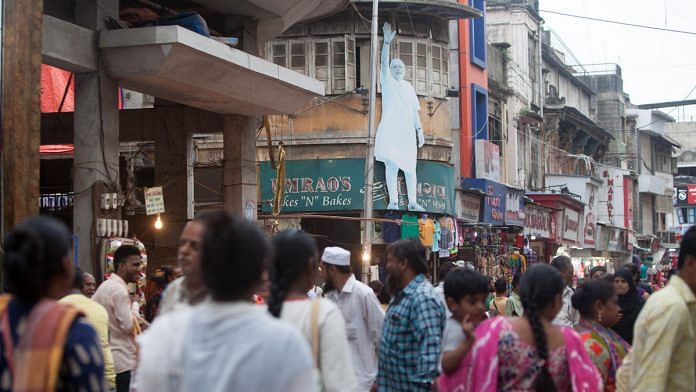Cabinet note cites 2010 report which found very little difference in economic conditions of upper castes and OBCs at the lower levels.
New Delhi: The Narendra Modi government’s decision to provide 10 per cent reservation for ‘poor’ upper castes appears to be based on a 2010 report which found that there was not much difference between the economic conditions of those in the general category and those in the other backward classes (OBCs).
The official note from the Modi Cabinet meeting Monday, where the decision was finalised, cites the S.R. Sinho commission report, which stated that 35.3 per cent of those in the general category (GC) didn’t possess any land as against 39.1 per cent of OBCs.
In certain states, the illiteracy rate of the general category and OBCs was “almost the same”, though the illiteracy status of general castes was less than that of SCs/STs/OBCs.
“While the socio-economic condition of the GC was much ahead of the SCs/STs and better than OBCs, it was noted that there might be segments within the GC having status equal to or worse than that of the average OBCs on several parameters such as education, occupation, land holding, health and housing,” ‘said the Cabinet note based on the commission’s report.
“The important finding was that at the lower end of their respective spectrums, the GC and the OBCs were comparable on weakness on a large number of parameters,” it added. “The weak status on literacy and primary education, land holding, housing, etc. was not too different at the lower end of the two social groups.”
Based on the survey report, the commission had concluded that the general category made up 31.2 per cent of the total population and the economically backward classes would emerge from it.
‘Poverty among GCs’
The Sinho report quotes the 2004-05 NSSO survey and the Census 2001 to show that 18.2 per cent of those in the general category were below the poverty line (BPL), representing 5.85 crores in absolute numbers.
It was 2 crore less than the BPL people among SCs and 1.60 crore higher than those among STs, the 2010 report said.
“However, while the poor among backward classes were eligible for affirmative action measures, including reservation arising from their entitlement as socially and educationally backward classes, the poor among the GC were not eligible for such measures,” the report reads. “This makes a strong case for affirmative action measures in favour of the economically weaker people among the general category.”
Although the share of general category and OBCs was considerably lower compared to that of SCs/STs in labour, a “remarkable status of equity” was the uniform percentage of engagement in regular salaried jobs in urban India by all four groups, according to the Sinho commission report as cited in the Cabinet note on the proposed reservation for upper castes.
The percentage participation from general category (42 per cent) was equal to that of the STs (42.5 per cent) and SCs (42.9 per cent) while the OBCs’ engagement in jobs was a shade lower.
Also read: BJP’s 10 per cent reservation for upper castes is votebank politics, but will face legal issues
Fineprint of the income criterion
The family income criterion of less than Rs 8 lakh per annum to be eligible for the proposed reservation for economically weaker sections has a caveat attached to it.
It’s not just the salary that would be calculated for this purpose. The income would include all sources, including salary, agriculture, business and profession, among others, as per the official note cleared by cabinet Monday.
And the family may include the person who seeks the benefit of reservation, “his/her parents and siblings below the age of 18 years as also his/her spouse and children below the age of 18 years”, stated the Cabinet note. The income will be certified by an officer, not below the rank of tehsildar.
No impact on the availability of seats for reserved category
There will be no impact of upper castes’ reservation in educational institutions on reserved category students in terms of the availability of seats.
As per the Cabinet note, central educational institutions would be able to increase the number of seats over and above its annual permitted strength in each branch of study or faculty to provide for the additional seats required for the economically weaker sections in the general category.
Any financial implications arising due to the increase in seats would be borne by the institutes out of the additional revenue generated by them, “on account of the increase in seats or otherwise”.
Also read: Why Modi government’s quota move may not yield the results it wants




Hey do you by any chance have the Sinho Commission Report. I have been looking for it but cant find it
The Sinho commission recommedations were based on the questionable data of partication of general category in salaried jobs as compared to other backward classes especially sc’s and st’s and equally absurd claim of general category castes having same status on land holding, education, occupation etc as compared to sc’s/st’s and obc’s. If it was so they should be classified as sebc’s as other’s on the criteria developed by the mandal commission and approved by both the parliament and the supreme court. Moreover it was an open secret general category castes are over represented in all level’s of administeration and have near monopoly in the private sector.
Gareeb mulq hai. No reason to believe “ upper castes “ can prosper in such a situation, apart from a certain sense of superiority the pernicious caste system bestows upon them. Successive governments have ducked their basic obligation to initiate a phase of high economic growth, through structural reforms, that can last for a generation and end mass poverty. This 10% reservation for the less well off from the general category is a mere placebo.